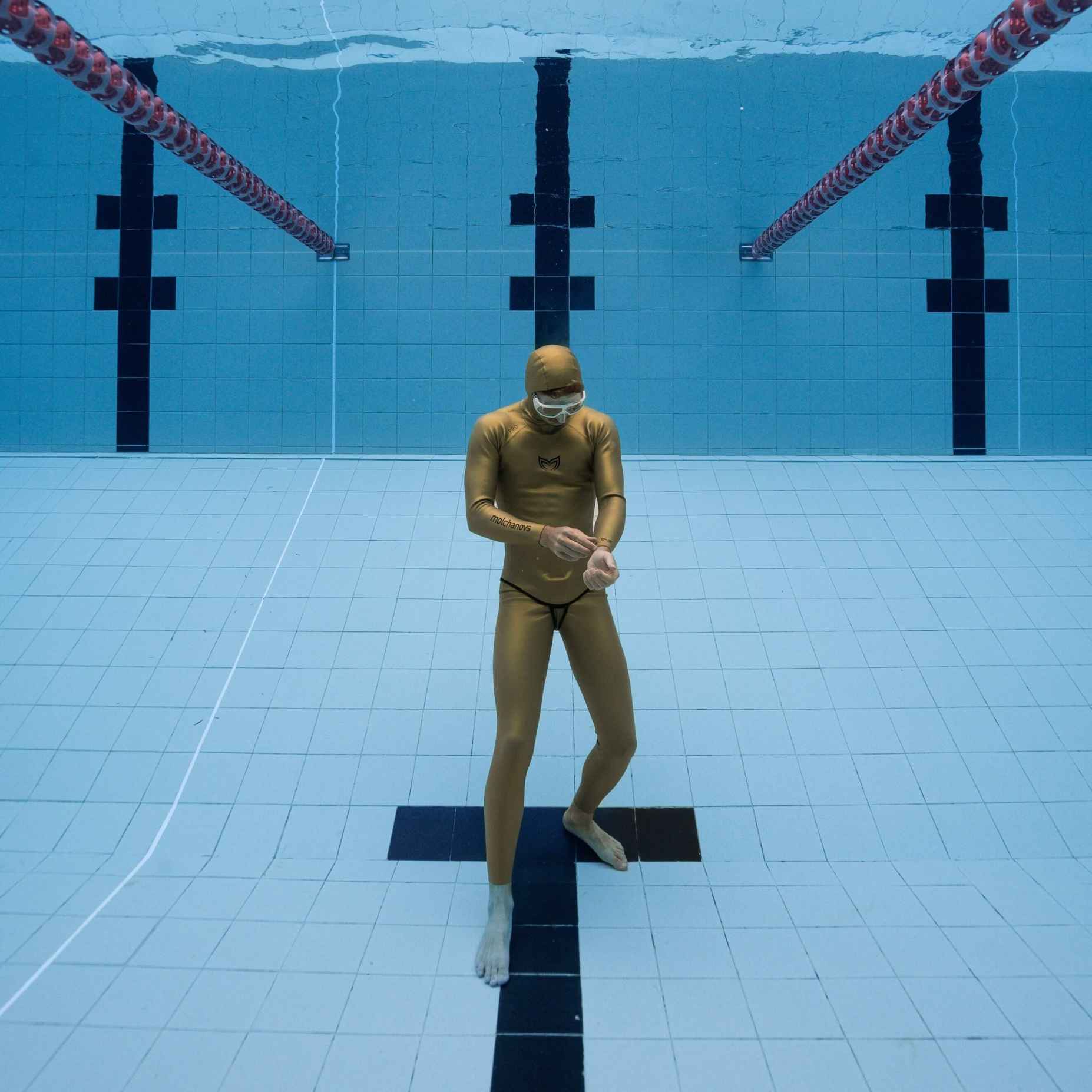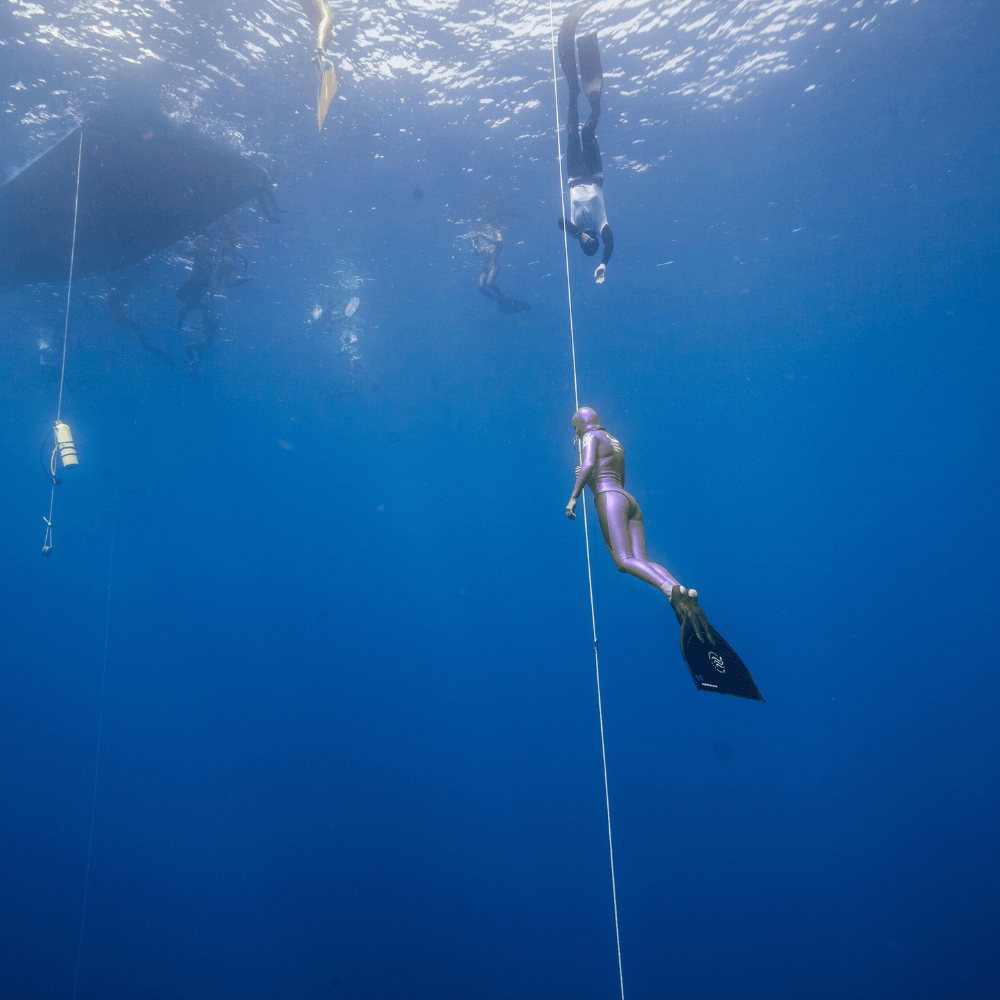Iron: The Unsung Gear in a Freediver's Kit

Iron deficiencies could be cutting your dives short.
By Tara Kate Rawson
Editor: Deena Lynch
The hidden role of iron in freediving performance and endurance. © @andac.kazaar.
As a sports dietitian who recently navigated iron deficiency anemia while maintaining competitive freediving training, I've gained unique insights into how this common deficiency impacts breath-hold performance and underwater endurance.
According to the Australian Institute of Sport, iron deficiency affects 15-35% of female athletes compared to just 3-11% of male athletes. For freedivers, where oxygen efficiency is literally life and death, understanding iron absorption becomes even more critical than for land-based sports.
Why Iron Matters for Freedivers
Freediving demands exceptional oxygen transport and utilisation. Iron is essential for:
- Haemoglobin production: Carries oxygen from lungs to working muscles + brain
- Myoglobin function: Stores oxygen in muscle tissue for anaerobic phases
- Energy metabolism: Powers cellular processes during breath holds
- Recovery capacity: Supports rapid oxygen debt repayment between dives
Even mild iron deficiency can reduce VO₂ max by 10-15%, devastating for a sport where every millilitre of oxygen counts.
The Absorption Reality: What the Science Shows
The Australian Institute of Sport have researched the difference between iron consumed and iron absorbed:

Haem Iron Sources (Animal Products):
- Beef, lamb, kangaroo: High absorption rates (15-35%)
- Fish, chicken, pork: Moderate to high absorption
- These sources provide readily available iron your body can easily use
Non-Haem Iron Sources (Plant Foods):
- Legumes, fortified cereals, tofu: Variable absorption (2-20%)
- Even iron-rich plant foods show significant unabsorbed portions
- Absorption dramatically improves when paired with vitamin C
The graph reveals something crucial: even foods high in total iron content may deliver relatively little absorbable iron without strategic food combinations.
Iron Requirements for Freedivers
Baseline Daily Needs:
- General population women (pre-menopause): 18mg
- General population men: 8mg
Freediver Requirements: Training freedivers need an additional 1-2mg daily due to exercise-related losses and oxygen demands:
- Female freedivers: 19-20mg daily
- Male freedivers: 9-10mg daily
Plant-Based Freedivers: Due to lower iron absorption (2-20% vs 15-35% from animal sources):
- Vegetarian females: 30-32mg daily
- Vegetarian males: 14-16mg daily
High-Risk Groups: Female freedivers face the greatest challenge due to menstrual losses plus training demands. Symptoms include shorter breath holds, slower recovery between dives, training fatigue, and poor adaptation to increased loads.
 Iron absorption dramatically improves when paired with vitamin C.
Iron absorption dramatically improves when paired with vitamin C.
Strategic Iron-Rich Meals for Freedivers
Pre-Dive Session Smoothie:
- 1 cup iron-fortified plant milk
- ½ cup spinach
- 1 banana
- ½ cup rolled oats
- 1 cup mixed berries (vitamin C boost)
- 1 scoop protein powder
- 1 tbsp nut/seed butter
- ½ tsp spirulina
Iron content: 4.2mg (perfect 2-3 hours before training)
Post-Dive Recovery Lunch - Baked Salmon with Roast Vegetables:
- 150g baked salmon fillet
- Quinoa (1 cup cooked)
Roasted capsicum, broccoli, and sweet potato - Handful of pumpkin seeds
- Lemon and olive oil dressing
Iron content: 4.5mg (optimises recovery and oxygen debt repayment)
Dinner - Beef Curry with Brown Rice:
- Lean beef curry (150g beef with tomatoes, spinach, lentils)
- Brown rice (1 cup cooked)
- Steamed broccoli with lemon
Iron content: 8.4mg (supports next-day performance)
Freediver-Specific Snack Ideas:
- 30g dried apricots, 30g almonds + pumpkin seeds + orange. Iron content: 2.1mg
- 2 tbsp Hummus with capsicum strips and cherry tomatoes. Iron content: 1.8mg
- 30g Iron-fortified cereal with berries. Iron content: 3.8mg
- 25g Quality beef jerky + Kiwifruit. Iron content: 2.2mg
Optimising Absorption for Maximum Performance
Enhance Iron Uptake:
- Pair iron-rich foods with vitamin C sources (citrus, berries, capsicum, tomatoes)
- Include sustainable seafood or grass-fed meat with plant-based iron sources
- Choose fermented foods to reduce iron inhibitors
- Time iron-rich meals 2-3 hours before training for optimal absorption
Avoid These Combinations:
- Coffee or tea within 1 hour of iron-rich meals (save that post-dive coffee!)
- Calcium supplements or dairy with iron-rich foods
- High-fibre foods immediately with iron sources
When to Seek Professional Support
Iron supplementation requires careful professional oversight. Self-supplementation can be dangerous; excess iron causes toxicity and organ damage. Some individuals have conditions like haemochromatosis where iron supplementation could be harmful.
Red Flags for Freedivers to see a doctor, a dietitian, and get a blood test:
- Decreased breath-hold times despite consistent training
- Slower recovery between dives
- Unusual fatigue during or after sessions
- Poor adaptation to increased training loads
- Frequent infections or illness
The combination of absorption-optimised nutrition +- supplementation and professional monitoring typically shows measurable improvements within 8-12 weeks.
 From the surface to the deep iron supports energy, focus, and breathhold performance. © @tarakaterawson taken by @junglefreediver.
From the surface to the deep iron supports energy, focus, and breathhold performance. © @tarakaterawson taken by @junglefreediver.
The Freediving-Specific Bottom Line
For freedivers, iron isn't just about preventing anaemia, it's about maximising the oxygen-carrying capacity that defines our sport. Whether you're chasing depth records, extending breath holds, or simply wanting to feel strong throughout your training sessions, strategic iron nutrition deserves the same attention as your equalisation or relaxation techniques.
Key Takeaways for Freedivers:
- Female freedivers need 19-20mg daily; males need 9-10mg daily
- Plant-based freedivers may need double these amounts
- Focus on absorption enhancement, not just iron content
- Time nutrition around training for optimal uptake
- Monitor status through proper medical testing
- Seek professional guidance for personalised strategies
As someone who has experienced both the depths of iron deficiency and the heights of optimal performance, I can tell you that investing in your iron status is directly investing into your potential.
For freediving-specific nutrition strategies or concerns about iron deficiency, consult an Accredited Sports Dietitian and discuss testing with your doctor.
Subscribe to the Magazine for the latest articles, including more nutritional advice, tips, stories and competition reporting.
About Tara Kate Rawson: Tara Kate Rawson is an Accredited Sports Dietitian and freediving athlete who combines evidence-based nutrition science with real-world freediving experience to help athletes optimize their underwater performance.
Disclaimer: This article discusses general nutrition tips for freediving and is not a replacement for personalised medical or dietary advice. Every individual’s health and physical condition is unique—please consult a medical professional before implementing any nutritional changes related to freediving performance or safety.
References: Australian Institute of Sport Sports Supplement Framework - Iron (2025), and peer-reviewed research on iron absorption and athletic performance.




Leave a comment